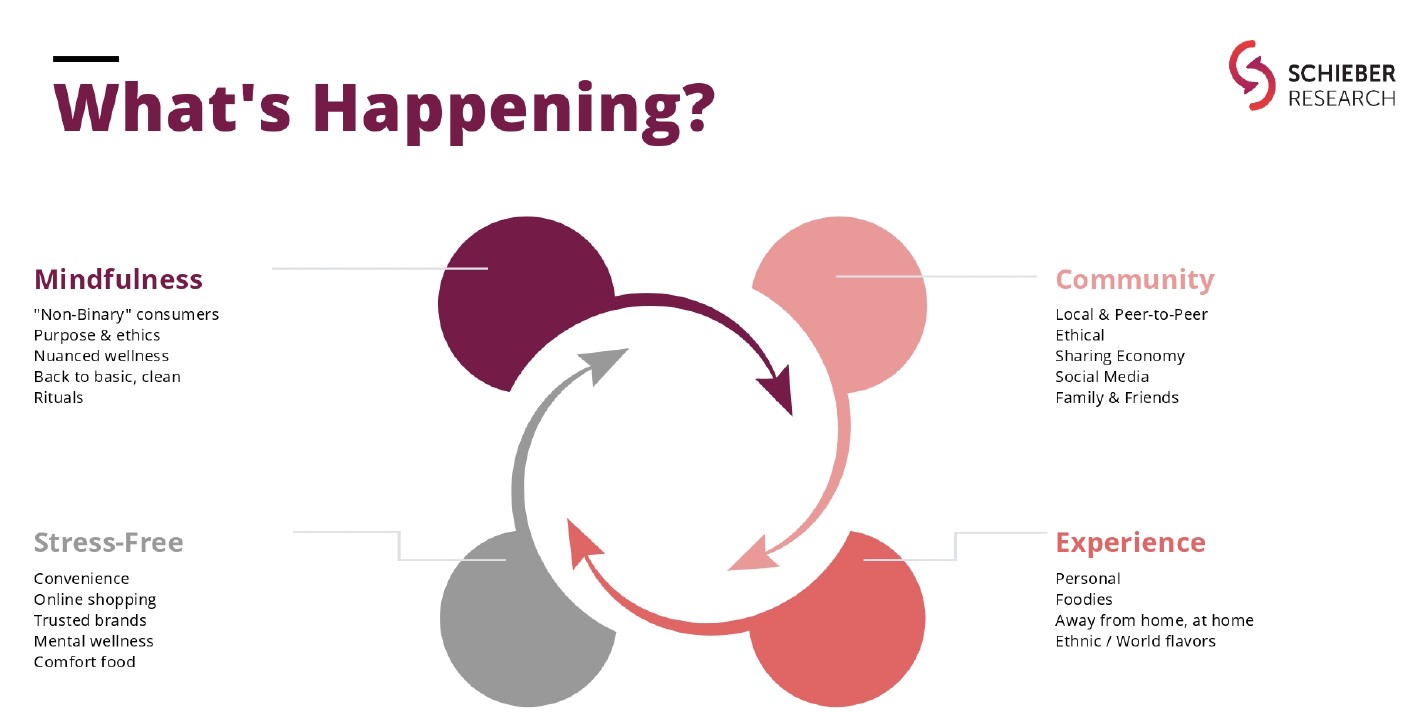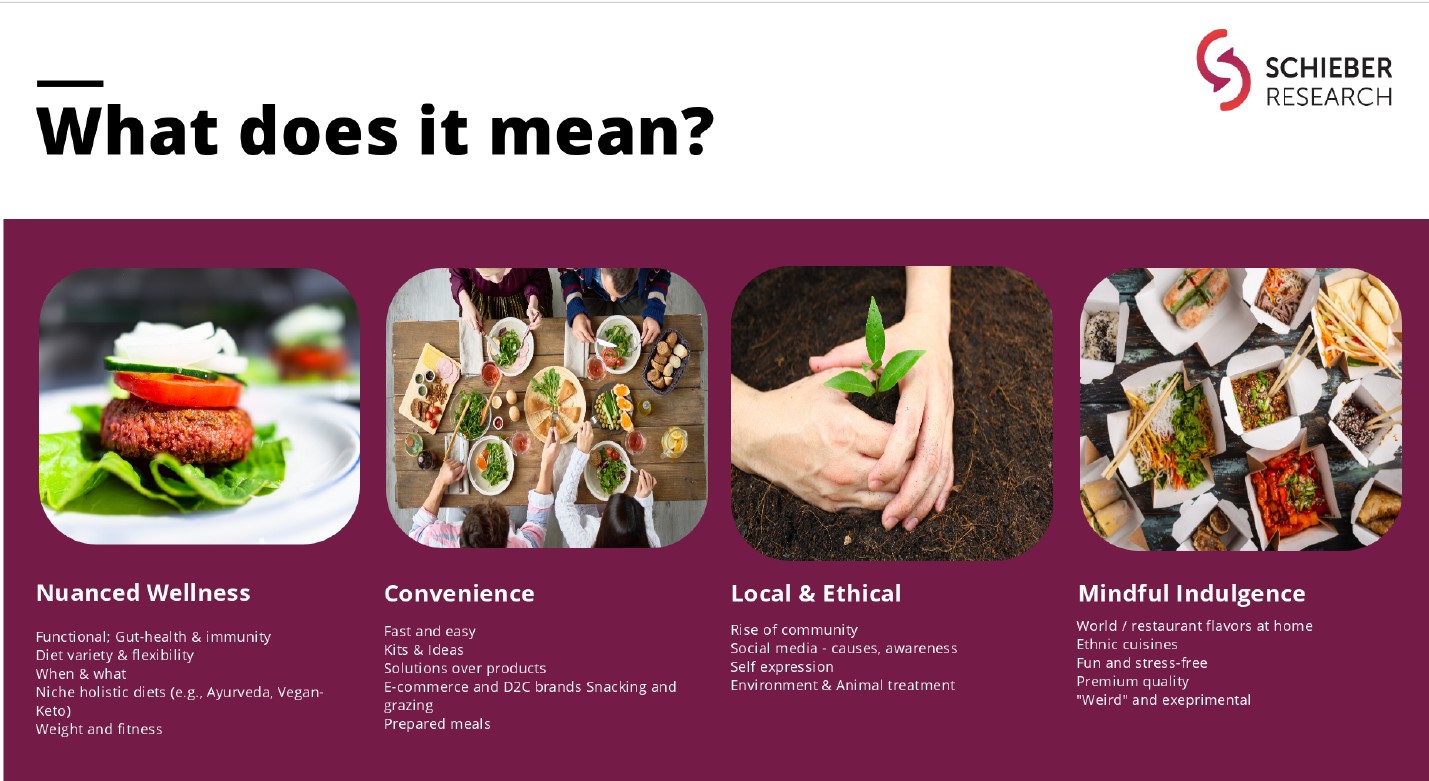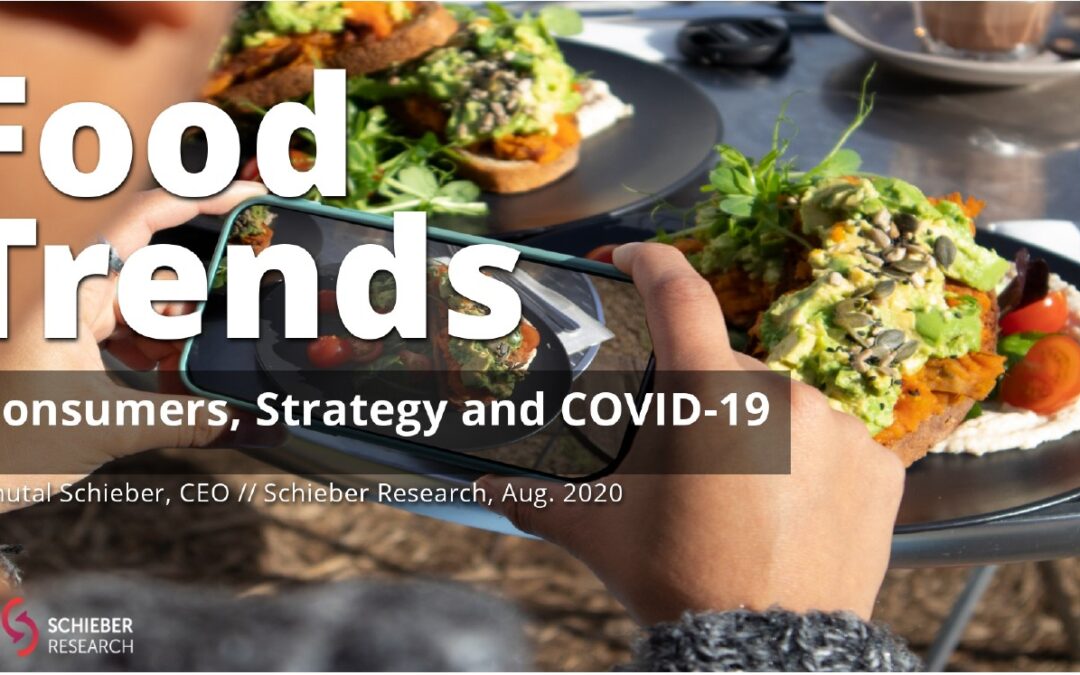Today, more than ever, consumers need all the help they can get from manufacturers and retailers. It is important to note that the many sources of influence and knowledge consumers are exposed to these days, created a whole new set of demands and expectations; and marketers must meet them in order to gain loyalty.
The 2020s require food manufacturers and retailers to break decades-long paradigms, to keep up with a more mindful, “non-binary” consumer, who is willing (and able) to experiment and engage with new brands who provide more nutrition, wellness and indulgence, for less stress, time and money.
The 4 big mega-trends shaping consumer lifestyles for the last few years are mindfulness, stress-free, community and experience.

Mindfulness means that consumers are rethinking why, what, where, and WHEN they eat. This creates a “non-binary” consumer, who does not necessarily adhere to boxes created by manufacturers.
Nuanced Wellness
Today, wellness is varied. It pertains to both mental and physical health, through “food tribes” which consumers can cross from time to time, adopting and abandoning strategies for weight management and functional benefits – including Keto, Vegan, Intermittent Fasting and anything in-between. With the COVID-19 pandemic, many of these needs are shifting.
Indeed, a report by Kitchen Stories in December, 2019 found that the vast majority of consumers in the USA, the UK and Germany are considering nutritional information and/or ingredients when making purchase decisions. And according to Bernstein Research in April 2020, due to COVID-19, more US consumers look for foods with health benefits, but those benefits vary, and include: “real food with simple natural ingredients and fewer additives” (37.9%), “General wellbeing, including digestive benefits, strengthening immune system, etc.” (34.5%), “weight loss” (33.3%) and “managing health conditions” (21%).
And so, marketers and retailers who keep trying to define consumers in a very binary, box-fitting way, are preparing for failure.
Case in point – Plant-Based. In their search for more protein, consumers are looking for non-meat sources to blend into their daily meals, with many “plant-based” eaters citing health as the key factor for this decision. As of 2017, nearly 30% of Europeans stated that they intend to eat less meat in the next five years and 40% of them said the reason for doing so was health, followed by animal welfare cited by 17% of consumers. But “less meat” does not mean “no meat”, and the most successful vegan products are those targeted towards a variety-and- indulgence-seeking “omnivore”, rather than to purely vegan consumers.
If past years’ brand management books advised not to “confuse” consumers with too many messages, this decade will teach us that consumers are willing to spend more time learning about products and taking away what they need from it – many times, more than one key attribute (for example, many of today’s emerging brands tout “vegan”, “keto”, “gut healthy” and more, all on the front of the package).
Yet, we will continue to see Gut Health, as the most important trend in health and wellness as scientific findings about the mind-body connection to the microbiome, meet consumers’ interest in better digestion, physical and mental wellness. Per a Kerry Group 2019 research, 19% of consumers seeking to change their diet, are doing so to improve their gut health. The report also stated that 68% of consumers are interested in consuming food with immunity-boosting benefits at breakfast, a number that has probably increased following the pandemic.
Foodie Culture
With that in mind, consumers need companies to first and foremost deliver superior food experiences. The Foodie culture is more amplified due to social media and food sharing, and it is also a part of any diet regimen. Taste, fun and connection through food is more important than ever in times of stress; and the micro-trends of “restaurant experiences at home” or “taste the world” matter more when people can’t visit restaurants and/or travel. Familiar comfort food, which is on the rise during COVID-19, will take a backseat again, with “weird” and new experiences attracting young consumers in the long run.
Ethical and Sustainable
Ethical consumerism is not a new trend and many surveys demonstrate that all around the globe, consumers prefer local and ethically sourced/made products, as they ask brands to “help them become better people”. The pandemic will accelerate this trend, as consumers are more open to the notion of making some sacrifices for a greater good, and are more socially aware.
This trend is part of the “Back to Basics” mega-trend; and it includes all-natural, less ingredients, “no B.S” food. Organic food is important to many consumers across the world. In Germany, for example, about 32% of consumers reported that more than 50% of their cart filled with organic food, and an additional 37% reported that between 10% and 50% of their cart is organic.
Solutions over Products
Consumers want “More for Less”: nutritious, tasty meals for the entire family, that cost less time and money. A recent Morning Consult survey asked consumers, “what are you trying and intending to continue buying in food and beverage brands due to COVID-19?”, and the results demonstrate a stressed consumer who just needs – more. 35% of US consumers said they will buy more healthy food; snack or junk food was cited by 29%, alcohol by 19%, non-alcoholic beverages by 16%, and readymade or microwave meals by 16%.
In Europe, as well as in the US, consumers say it is “very important” for them to eat together as a family – but a Kitchen Stories survey found that, for the USA and the UK, consumers are looking to spend less than 30 minutes on a weeknight meal.
As a result, we see, and will continue to see a lot of convenient solutions. These are not your mother’s TV meals, but rather, ethnically-varied, high quality, nutritional meals, as well as creative meal kit solutions, including specific vegetables and canned goods that are needed to make a quick meal without the stress of hunting all the ingredients in the store and/or planning dinner.
Convenience solutions also pertain to the mega-trend of snacking and consuming smaller meals throughout the day, which is practiced by 95% of adults according to a 2019 Mintel study. Kerry Foods found that two thirds of people say they seek functional benefits when they snack, and we will continue to see snacks offering more protein, functional ingredients such as nootropics and adaptogens (e.g., lion’s mane, reishi and ashawagandha), and fruit/vegetables.

—
Solutions over Products thinking: Help me with…
My family – with more people in the household eating more meals at home, consumers are looking for nutritious, affordable and tasty meals that are easy to make. They are also looking for fun and shareable food experiences, to mitigate stress. With Work From Home expected to increase substantially, more meals will be prepared and consumed at home well into the future.
My health – better ingredients; “clean” food – safe and natural; mental and physical wellness, including gut health, and less stress.
My Conscious – help me help my community; local manufacturing, sustainable and environmental practices, handmade and small batch, plant-based.
My wallet – everyday premium products, high-quality indulgent food that recreates away from home experiences; bigger packs and concentrated buying.
—
For a limited time, download the report here.
To book a live presentation with Hamutal Schieber, a world-class expert on consumer goods trends and innovation, including an optional virtual brainstorming session, please contact us at info@researchci.com for a quote.


Seems all of these resources are from prior to Covid-19 where I’m interested in here and now which is much, much different than before March of 2020.
Yes, that’s correct! As you’ll see in the accompanying recording, the notion is that we need to understand mega-trends in order to understand what is happening due to COVID-19 and what will be happening in the “New Normal”. However, there’s plenty of information out there about consumption during CODID-19. Shoot us and e-mail, we are always happy to help!
Link is not coming through for the food trends report